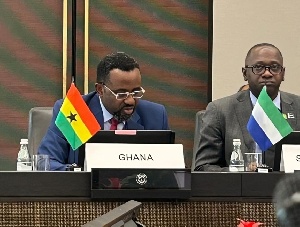Business News of Thursday, 24 April 2025
Source: www.ghanawebbers.com
BoG Governor urges IMF to reform debt tools for Africa
Dr. Asiama spoke about "Debt Vulnerabilities in Developing Countries." He warned that by the end of 2024, half of sub-Saharan African nations may face debt distress or high risk. This situation follows shocks from COVID-19, geopolitical instability, and climate disasters.
“African countries are struggling with heavy debt service obligations,” Dr. Asiama said. He noted that public spending on interest payments now exceeds spending on health and education. This imbalance limits fiscal space for social and development spending, hindering progress toward Sustainable Development Goals (SDGs).
The governors emphasized that while African governments aim for responsible debt management, domestic reforms alone are insufficient. They called for stronger international support, especially from the IMF. This support is crucial to help countries manage debt vulnerabilities and build resilience against external shocks.
“We are implementing policies to restore fiscal sustainability,” the Governor stated. “However, we need more cooperation from development partners like the IMF.”
One key proposal was to strengthen the IMF’s debt sustainability framework (DSF). The African governors argued that this framework must adapt to new debt instruments and risks related to climate change.
They requested improvements in early-warning capabilities to prevent unsustainable debt accumulation without restricting access to development finance. “We urge the IMF to enhance its risk assessment tools,” Dr. Asiama said.
The governors also highlighted the need for a more active role from the IMF in debt restructuring and relief efforts. They welcomed initiatives like the Global Sovereign Debt Roundtable but stressed these processes need streamlining for faster outcomes.
“Improving transparency and incentivizing private creditor participation is crucial,” Dr. Asiama added. He mentioned that discussions on equitable treatment for heavily indebted countries are necessary.
On a broader scale, they urged better policy coordination among international financial institutions (IFIs). They recommended tailored financial support based on country-specific needs and innovative financing mechanisms like blended finance.
“The IMF must recognize Africa’s debt vulnerabilities linked to climate risks,” he stated. They called for ambitious concessional financing options and joint financing platforms.
IMF Managing Director Kristalina Georgieva acknowledged these concerns. She emphasized that the IMF should play a more active role in debt restructuring for low- and middle-income countries facing rising challenges.
She highlighted a new 'playbook' being developed by the Global Sovereign Debt Roundtable to guide complex debt restructuring processes. This playbook will be released during upcoming IMF and World Bank meetings.
Ms. Georgieva warned that African economies remain vulnerable to external shocks which could reverse progress in controlling inflation and stabilizing debts. Growth forecasts for Africa have been revised downwards to 3.9 percent by 2025.
The meeting concluded with a renewed call for deeper dialogue among stakeholders facilitated by the IMF. The African bloc expressed hope that ongoing reviews of low-income countries’ debt sustainability analysis will lead to meaningful reforms.











